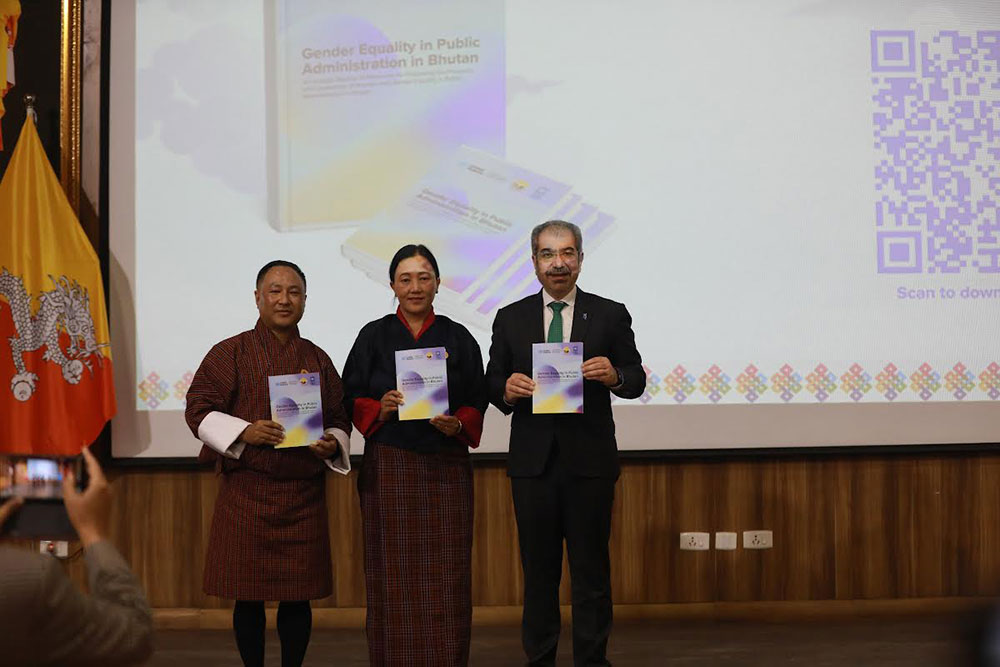The review, supported by UNDP and UNDESA, assessed measures to promote women’s leadership in public administration, including legal and policy frameworks, human resource policy and practices and monitoring and accountability frameworks, both at the national and local level.
Staff Reporter
Thimphu, Friday, November 15, 2024: Despite continuous efforts, the women’s presence and leadership in the public administration of Bhutan remains minimal. According to the Civil Service Statistics 2023, women comprise only 23 percent of the total civil servants at the executive level.
A review of the measures to promote women’s presence and leadership in the public administration carried out by the National Commission for Women and Children (NCWC) cites social and cultural norms and practices related to women’s leadership capabilities, traditional gendered roles, and gendered-occupational segregation as a key barrier to enhancing gender equality.
Another key finding is that men’s continued dominance in the civil service increases the likelihood of patriarchal values and stereotypes being reinforced, influencing key workplace decisions. The assessment also revealed limited awareness on national policy and commitments towards promoting gender equality as well as responsibilities of ministries and agencies in gender mainstreaming as another barrier to promoting women’s leadership in the civil service.
Launching the assessment report on Gender Equality in Public Administration at the Bhutan Sustainable Development Goals (SDGs) Partnership Week in Thimphu, the Director of the NCWC Secretariat, Tashi Namgyal, called on the agencies across the civil service to step up efforts to tackle social and cultural norms that impede women leadership. “There must be a concerted agency-wide effort if we are to make a transformative and long-lasting progress. Agencies must take strong ownership of this responsibility to achieve our shared goal of a gender-equal public administration.”
Commissioner Kinlay Tshering of the Royal Civil Service Commission said gender ratio in the civil service is nearly balanced, but most women are still concentrated in lower-level positions. However, recruitment in the Professional and Management Category (PMC) entry level has now reached a 50:50 gender balance, highlighting significant stride in promoting educational progress. “This group of women within the PMC represents a growing pool of potential leaders. Therefore, conscious efforts must be made to break down the barriers that is holding back Bhutanese women and encourage their equal participation and leadership in the public sector.”
The review was supported by the United Nations Development Programme (UNDP) and United Nations Department of Economic and Social Affairs (UNDESA) to draw attention to the state of gender equality in the public sector. “In Bhutan as well as globally, the public sector remains the largest employer. Therefore, the sector possesses tremendous potential to uphold women’s rights to equal and full employment and public participation, serving as an example to other institutions. A critical mass of women in public administration, particularly in the senior leadership positions, is vital for promoting effective, inclusive and accountable public policy making and service delivery,” said Mohammad Younus, UNDP Resident Representative.
This report will serve as an important resource for the government to design policy and programming that accelerate women’s equal participation and leadership in public administration and beyond.
Based on the findings, the review outlines a set of recommendations, which includes enhancing institutional and policy frameworks for gender equality and strengthening accountability on gender mainstreaming including gender responsive human resource auditing.
The review also recommended development and implementation of temporary special measures and gender parity systems in the process of appointments, including measures to eliminate structural inequalities and gendered-occupational segregation.
Accordingly, an action plan to implement these recommendations has been developed.


